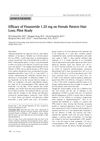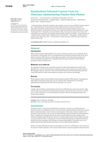Search
for
Sort by
Research
150-180 / 1000+ results
research Low-Dose Naltrexone: A Novel Adjunctive Treatment in Symptomatic Alopecias?
Low-dose naltrexone might be a cheap and effective additional treatment for hair loss with scalp discomfort due to its anti-inflammatory effects and few side effects.

research A 25-Year-Old Man with Androgenetic Alopecia Developed Symptoms of Post-Finasteride Syndrome After Treatment with Finasteride and Dutasteride
Man experienced post-finasteride syndrome symptoms after using finasteride and dutasteride for hair loss.

research Analysis of 1,25-Dihydroxyvitamin D3 Receptors in Basal Cell Carcinomas
Basal cell carcinomas have much higher levels of Vitamin D3 receptors compared to healthy skin.
research The Differential Diagnosis of Hirsutism and Virilism
The document likely discusses how to tell the difference between excessive hair growth and the development of male characteristics in women.

research Hereditary Vitamin D Rickets: A Case Series in a Family
Three siblings with a genetic form of rickets showed different symptoms of the disease.
research Vitamin D and the Epidermis
Vitamin D is important for skin cell growth and health, and its active form and receptor play key roles in skin and hair processes.

research Vitamin D Receptor: New Assignments for an Already Busy Receptor
The vitamin D receptor is involved in multiple body functions beyond calcium regulation, including immune response and rapid reactions not related to gene activity.
research Reduction of Intrafollicular Apoptosis in Chemotherapy-Induced Alopecia by Topical Calcitriol Analogs
Topical calcitriol-analogs can reduce hair loss caused by chemotherapy.
research Hereditary 1,25-Dihydroxyvitamin D-Resistant Rickets
HVDRR is caused by VDR gene mutations, leading to vitamin D resistance, treatable with high calcium doses, but alopecia remains permanent.
research Protection Against Cyclophosphamide-Induced Alopecia and Inhibition of Mammary Tumor Growth by Topical 1,25-Dihydroxyvitamin D3 in Mice
Rubbing vitamin D3 on skin can help prevent hair loss from chemotherapy and slow breast tumor growth in mice.

research Multi-Trait Analysis of GWAS: Perceived Youthfulness in the UK Biobank
The conclusion is that certain traits, including perceived facial aging and BMI, are linked to perceived youthfulness differently in men and women.

research Multi-Trait Analysis of GWAS: Perceived Youthfulness in the UK Biobank
The conclusion is that certain traits, including perceived facial aging and BMI, are linked to how youthful people look, with some differences between males and females.

research Autonomous Robotic Surgery: Has the Future Arrived?
Autonomous robotic surgery is advancing but still requires human supervision for complex procedures.

research Novel Therapeutic Approaches in Utilizing Platelet Lysate in Regenerative Medicine: Are We Ready for Clinical Use?
Platelet lysate is a promising, cost-effective option for regenerative medicine with potential clinical applications.
research Tineas: Superficial Dermatophyte Infections
For hair fungal infections, take oral antifungals; for skin and nail infections, use topical antifungals, and keep affected areas cool and dry.

research A Review and Meta-Analysis of the Prevalence and Health Impact of Polycystic Ovary Syndrome Among Medical and Dental Students
PCOS affects nearly 25% of female medical and dental students, impacting their academic and social lives.

research Efficacy of Finasteride 1.25 mg on Female Pattern Hair Loss: Pilot Study
Finasteride 1.25 mg showed small improvements in hair density and thickness for female pattern hair loss, but more research is needed.

research Standardized Informed Consent Form for Clinicians Administering Platelet-Rich Plasma
A standardized consent form for PRP injections improves patient trust and legal protection.

research Protein Kinase C Is a Key Target for Attenuation of Leigh Syndrome by Rapamycin
Rapamycin may help treat Leigh syndrome by targeting protein kinase C.

research A Novel Finasteride 0.25% Topical Solution for Androgenetic Alopecia: Pharmacokinetics and Effects on Plasma Androgen Levels in Healthy Male Volunteers
New finasteride solution effectively reduces baldness-causing hormone, potentially with fewer side effects.

research Glucocorticoid and Sex Hormone Receptors: Clinical Implications and Therapeutic Relevance
Glucocorticoids and sex hormones affect skin health, with potential for targeted treatments to minimize side effects and treat skin conditions.

research Association of Insulin Resistance with Polycystic Ovary Syndrome Phenotypes and Patients’ Characteristics: A Cross-Sectional Study in Iran
Most women with PCOS have insulin resistance, especially those with phenotype B.

research Assessment of the Composition of Some Personal Hygiene Products (On the Example of Shampoos) Regarding the Negative Effect on the Human Body
Some shampoos have harmful ingredients that can cause health problems, but these are needed for the shampoos to work properly.

research Hair Restoration: Understanding Alopecia and Modern Techniques
Hair restoration has evolved to use follicular units for more natural results, moving away from older methods like large plug grafts and scalp reductions.

research Treatment of MSCs with Wnt1a-Conditioned Medium Activates DP Cells and Promotes Hair Follicle Regrowth
Wnt1a-conditioned medium from stem cells helps activate cells important for hair growth and can promote hair regrowth.

research Topical Spironolactone in the Treatment of Ocular Graft-Versus-Host Disease
Topical spironolactone may help treat ocular graft-versus-host disease with minimal side effects.

research Finasteride And Flutamide In The Treatment Of Hirsutism
Finasteride and flutamide can effectively treat hirsutism, with abdominal hairs showing the most sensitivity to the treatment.

research Prednisolone
A woman's hair grew back after she stopped taking the Parkinson's disease medication pramipexole.

research An Important Role of Cutaneous Lymphatic Vessels in Coordinating and Promoting Anagen Hair Follicle Growth
Skin lymphatic vessels are essential for hair growth.